When Disney’s Moana was released in 2016, people wrote and wrote and wrote about Moana as a different kind of Disney princess. I watched the movie—once in theaters with my kids and then again and again and again with them at home. The more I watched Moana, the more I started to think of her father, Chief Tui, as a different kind of Disney father. (I’ll tell you what I mean by that in just a minute.)
Eventually, I wrote a research essay on Moana that I published in an academic journal, Men and Masculinities, in 2020, titled “Chief Tui Makes Way: Moana, Misogyny, and the Possibility of a Profeminist Ethic.” That essay was 6,500 words and the publisher, Sage Journals, charges $37.50 just to read it!
No one should pay $37.50 to read that essay. And no one wants to read 6,500 words in a newsletter the day before Thanksgiving. So I’m presenting the condensed highlights of that essay here at From the Ethics Desk.
Oh, and Moana 2 hits theaters TODAY. Perfect timing.
The Problem with Disney Fathers
Disney often presents female empowerment as one girl’s rebellion against a domineering patriarchal figure. For instance, Ariel overcomes King Triton’s prejudices in The Little Mermaid, Jasmine sneaks out of The Sultan’s palace in Aladdin, and the domineering King Fergus organizes an archery competition of male suitors to shoot for marriage to Merida in Brave. (“I’ll be shooting for my own hand,” is Merida’s response.)
At first, Chief Tui (played by Temuera Morrison) supports Moana (played by Auliʻi Cravalho) as the eventual inheritor of his leadership position in the village. During the song “Where You Are,” he parades Moana, first as a toddler then as a teen, through the village transmitting the wisdom of the community’s practices as he sings: “This tradition is our mission. … Make way! Make way!” At the end of the song he even presents her with a future-chief’s headdress.
However, in exchange for “making way” for her leadership, Chief Tui expects Moana’s strict obedience. From the time that she is a toddler, he restricts her attempts to play in the ocean and demands that she stay within the reef that surrounds the island. The implication of “Where You Are” is that Moana will one day inherit this chiefly office only as long as she continues to sing the same song that her father sings.
Indeed, instead of focusing on the pending environmental catastrophe his village faces and his daughter’s proposal of an innovative solution upon her discovery of hidden boats, Chief Tui focuses on his own control and her violation of his rules. He angrily wields the power of his privileged position within the community only moments after telling Moana that her place is “right where you are.”
Chief Tui Makes Way
Moana escapes her father and undertakes a journey to acquire oceanic navigation and restore ecological harmony for her community. (She also takes seafaring leadership of a fleet of double-hulled canoes.) And this is where Moana differs so significantly from other Disney films, especially The Little Mermaid.
At the conclusion of The Little Mermaid Ariel marries her knight in shining armor. In a closing scene, King Triton elevates out of the water and rests on the side of the ship where Prince Eric bows to the him, and he bows in return. This indicates a transfer of custody of Ariel, her body, and her future from one man, the King, to another, the Prince.
Moana acquires her own skills and commands her own fleet. Her rebellion is oriented toward her own liberation and the survival of her people—no prince in sight.
And how does Chief Tui respond? He makes way.
Moana concludes with a visual montage revealing her leadership of the sailing fleet. Chief Tui assists his daughter in pulling the double-hulled canoes from the caves. Her conch shell tops the ancestral pillar, as the camera moves forward to reveal a fleet of ships sailing toward the horizon. Moana sets the direction of the canoe’s rudder, which Chief Tui will hold steady. She then instructs her mother, Sina, on the practice of tying knots for the sail.
Moana jumps again to survey the status of the fleet as a whole, then she jumps to the prow, with one hand on the sailing line, to assume her place as lead navigator.
In these closing moments, Chief Tui learns to make way for Moana by orienting his labor and attention toward her power rather than against it. This kind of making way is not inevitable—Chief Tui could still be pouting, as he was earlier in the film. Instead of standing in front of her to clear (or block) her path, however, Chief Tui stands behind Moana as she looks across the horizon from the prow of the canoe.
What does it mean to make way?
Are there any lessons for would-be feminist fathers to take away from Chief Tui in Moana? I think there are.
One lesson is that not all dad-feminisms are the same. Early in the film, Chief Tui is a kind of feminist—he believes, after all, that Moana can hold the same office that he holds as chief of the village. However, he thinks that she only deserves to inherit the tradition as long as she refuses to change it. At the conclusion of the film Chief Tui discovers a more liberatory feminism when he learns to commit to her vision, wherever it may lead. This invites us to ask: Is my commitment to feminism limited only to what I find traditional, comfortable, or safe? Where does it need to change?
Another lesson is that dad-feminism must be about more than feelings of affirmation or empowerment. Chief Tui’s service to Moana’s crew in the closing scenes of the film is a tangible enactment of his commitment to change: he does the hard work necessary for sailing choppy waters. He also submits his technical practice to her guiding hand, holding the canoe’s rudder in the direction that she sets. This invites us to ask: What feminist work needs to be done? How can I focus my time, attention, and labor on the right direction?
A final lesson is that dad-feminism is not an abandonment of masculinity but a critical reinterpretation of it. In the closing montage, Moana takes the position of the navigational guide previously held by the chief in a flashback, and Chief Tui takes the position of the crew member holding the rudder. Yet Moana wears neither the chief’s headdress nor necklace—those remain Chief Tui’s. I think this shows that chiefs are no less chiefs when they serve in the sailing crew, just as dads are no less dads when they embrace feminism. To put it another way, dad-feminism is a project of changing how we see ourselves just as much as it is a project of changing how we see our children. This invites us to ask: What expectations and visions of fatherhood did I inherit? What kind of father is the future calling me to be?
When Moana became a different kind of Disney princess, she spurred Chief Tui to become a different kind of Disney father. Her story is one of learning to step forward, find her place, and lead her community into a better future. His story is one of learning to step back, find his place, and join the community as it follows her lead.
In the end, Chief Tui learns to make way.
Before I go…
This essay only scratches the surface of the wider world of writing about Moana, and it is important to highlight some of the commentary of historians, critics, and scholars working in Polynesia, Melanesia, and Micronesia.
Cultural anthropologist Tevita O Ka'ili protested the omission of Hina, companion goddess to the god Māui, noting that it was a shallow “disneyfication” of complex Polynesian historical myths.
Mārata Ketekiri Tamaira and Tagi Qolouvaki wrote about gender, paternalism, and authority in their review of the film for The Contemporary Pacific.
Anne Keala Kelly noted the collapse of hundreds of languages and millions of people into a generic depiction of Polynesia in the film.
Even Chief Tui’s voice is subject to “musical colonization,” as American scholar Robin Armstrong noted. Maori actor Temuera Morrison voices the character, but vocals for “Where You Are” are overdubbed by American actor Christopher Jackson.
With that, I’m done. It only took 1,412 words, and it didn’t cost a penny.
In the published essay I thanked Annie Krabbenschmidt, Sara Evall, Mackenzie Coles, and Cameron Wu for their help, which means they deserve credit here, too! Thanks to each of you!



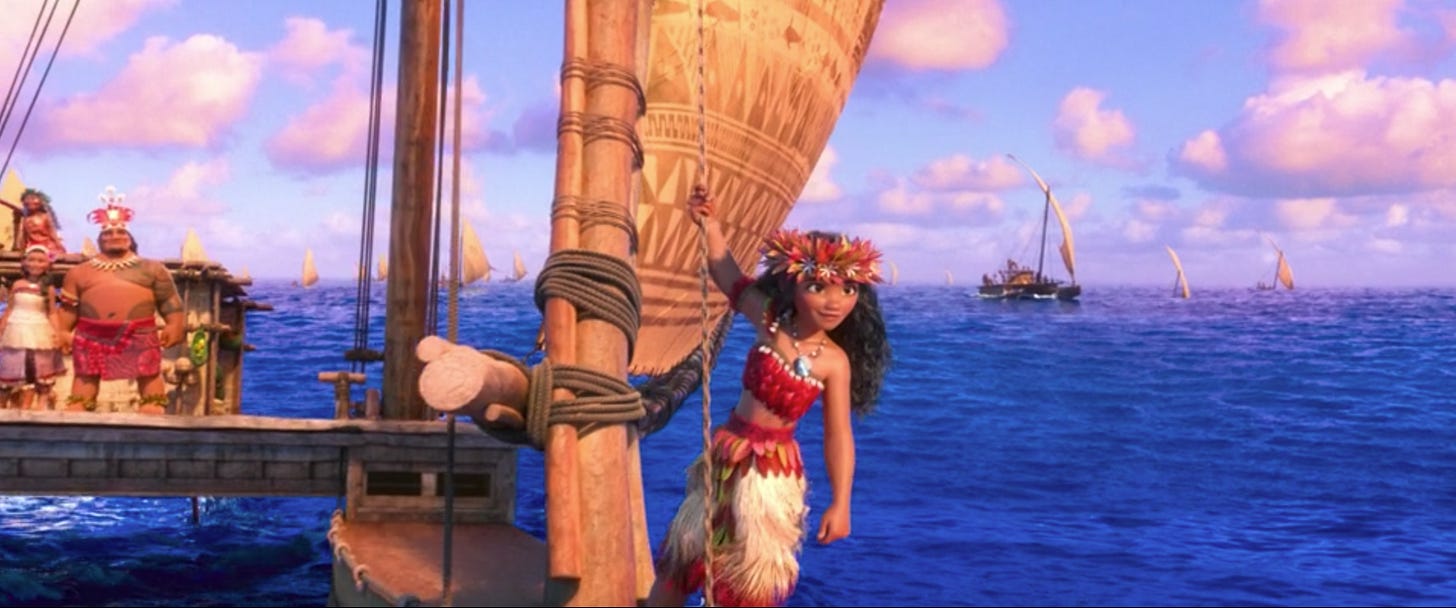
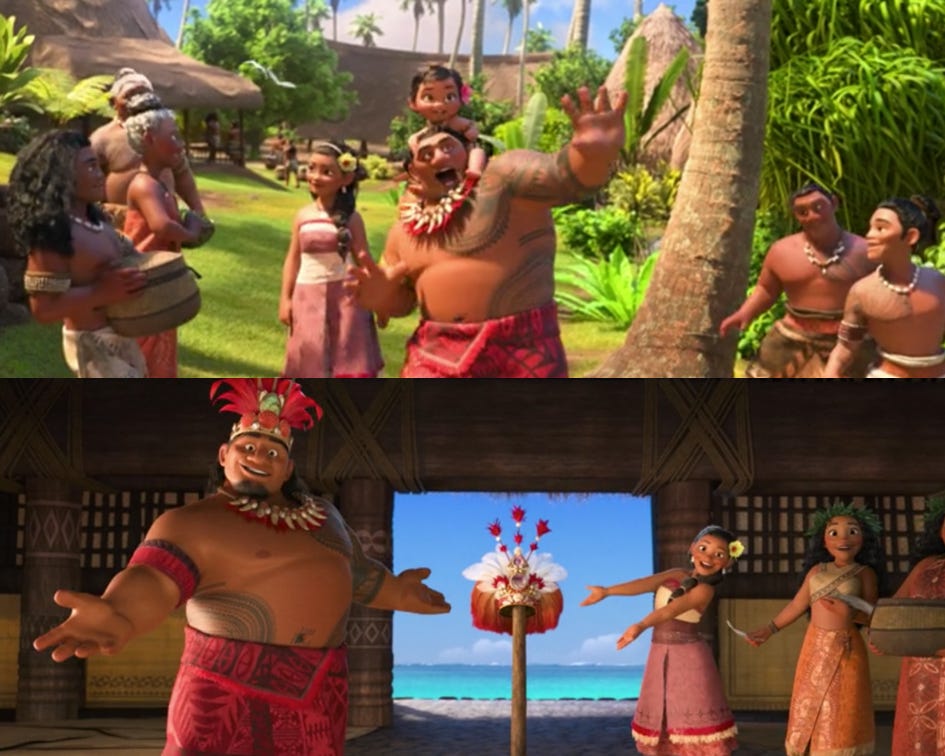
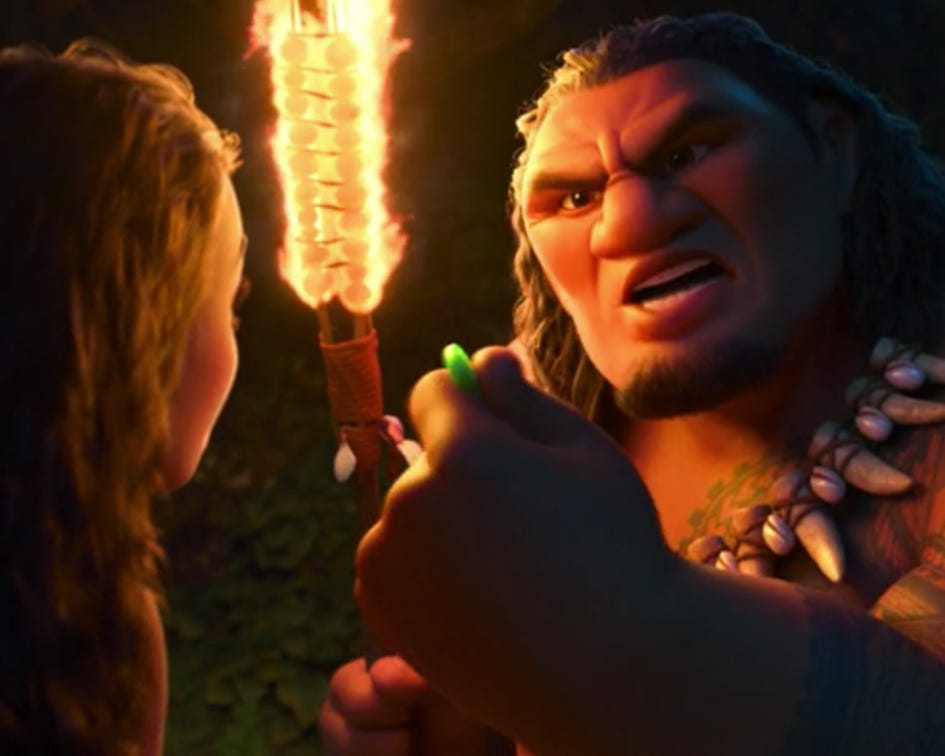
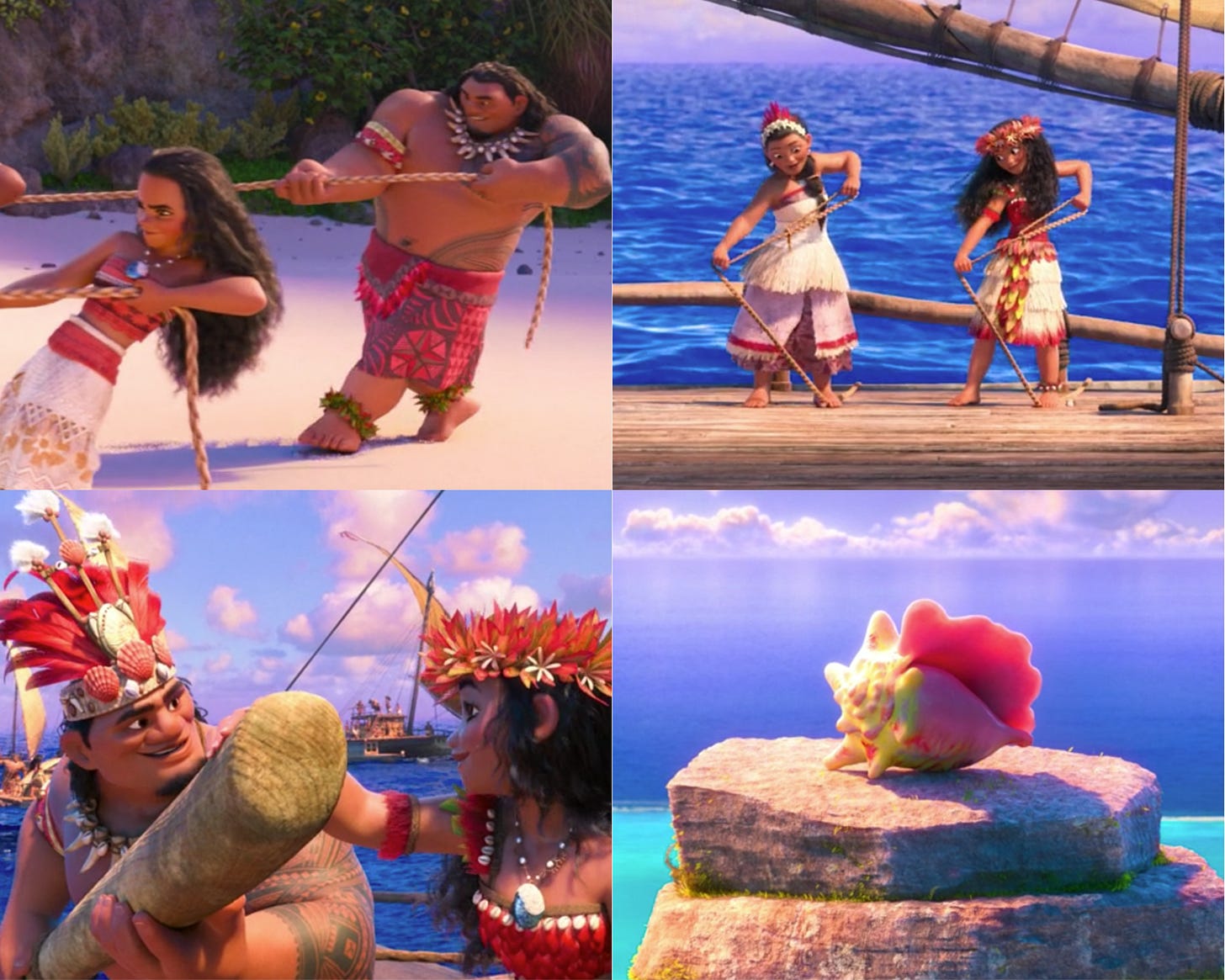
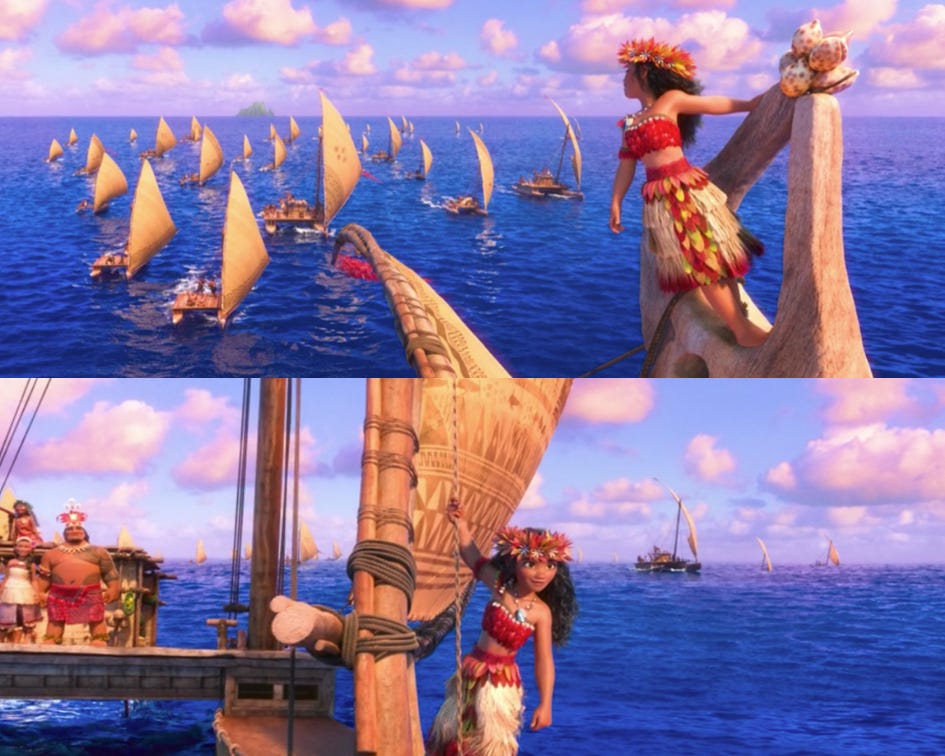

I’m so glad you shared this today. I’m going to send it to my (feminist) husband! Who I can offer hear whistling Moana songs even though the movie hasn’t played in our house for years. This is fantastic 💥💥💥